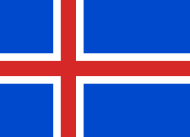Kingdom of Iceland facts for kids
The Kingdom of Iceland (in Icelandic: Konungsríkið Ísland; in Danish: Kongeriget Island) was a country that had a special link with Denmark. It was a constitutional monarchy, which means it had a king but also a set of laws (a constitution) that limited the king's power. Iceland and Denmark shared the same king, but Iceland managed its own affairs.
This kingdom started on 1 December 1918. It lasted until 17 June 1944. On that date, people in Iceland voted in a special election called a referendum. This vote led to the creation of the Republic of Iceland, which is how Iceland is known today.
How the Kingdom Started
The Kingdom of Iceland was formed when the Act of Union was signed on 1 December 1918. This important agreement gave Iceland the right to have its own flag. It also declared that Iceland would be a neutral country, meaning it would not take sides in wars.
Even though Iceland became its own kingdom, it still asked Denmark for help. Denmark was responsible for Iceland's foreign affairs, like dealing with other countries. Denmark also helped with Iceland's defense.
Becoming More Independent
In the early 1940s, Nazi Germany took over Denmark. This event made it impossible for Iceland and Denmark to communicate properly. Because of this, Iceland's parliament, called the Althing, decided to take full control.
The Althing declared that Iceland would no longer need Denmark's help. This was a big step towards Iceland becoming fully independent. Later, during World War II, forces from the British and American armies occupied Iceland. This occupation lasted until the war ended.
Becoming a Republic
The people of Iceland held a special vote about their future. This vote took place between 20 and 23 May 1944. They were asked if they wanted to become a republic with a new constitution.
A huge number of people, 98.5% of those who voted, chose to become a republic. This meant they wanted to have a president instead of a king. Christian X of Denmark, who was still the king of Iceland at the time, sent a message. He congratulated the people of Iceland on their decision.
See also
 In Spanish: Reino de Islandia para niños
In Spanish: Reino de Islandia para niños


